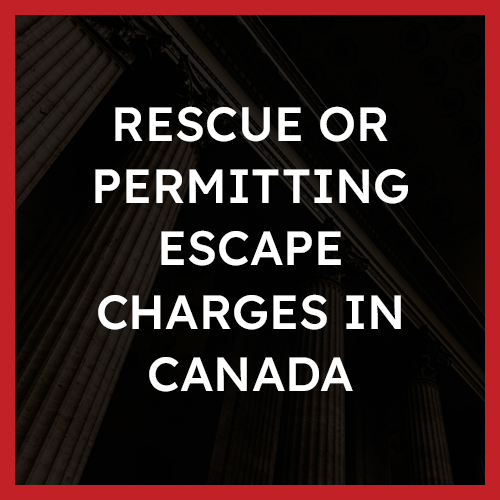What is a charge of Rescue of Permitting Escape?
Rescue or permitting escape is covered under section 147 of the Criminal Code of Canada. It occurs when a person knowingly aids, assists, or helps someone escape from lawful custody in Canada.
Examples
Some examples of a charge of Rescue of Permitting Escape may include the following:
- A person employed at a prison who wilfully permits someone to escape from lawful custody (see also prison breach)
- A person who provides assistance and enables someone to escape from custody who has just been arrested by the police
- A person who rescue’s someone from custody who has recently escaped and requires aid or assistance to further their evasive action.
Defences
The defences available to a charge of Rescue or permitting escape are entirely dependent on the facts of your case.
However, some defences to a charge of Rescue or Permitting Escape may include:
- The accused was wrongly identified as the person who committed Rescue or Permitting Escape
- The accused did not intend to provide aid, assistance, or concealment to a person who escaped custody by providing food, shelter, or other goods
- The accused did not know the person they were providing aid or assistance to had escaped lawful custody.
Punishment
A charge of Rescue or permitting escape is an indictable offence, which entails a maximum punishment as follows:
- Imprisonment for a term not exceeding five (5) years.
Have you been charged with Rescue or Permitting Escape?
Our experienced team of criminal defence lawyers is standing by to help you fight the charge. Contact us today for a free, no-obligation consultation to discuss the specifics of your case, your election and plea options, and craft a formidable defence.
Call Now 1-866-939-5940
Overview of the Offence
According to s. 147 of the Criminal Code:
Rescue or permitting escape
147 Every person is guilty of an indictable offence and liable to imprisonment for a term of not more than five years or is guilty of an offence punishable on summary conviction who
(a) rescues any person from lawful custody or assists any person in escaping or attempting to escape from lawful custody,
(b) being a peace officer, wilfully permits a person in his lawful custody to escape, or
(c) being an officer of or an employee in a prison, wilfully permits a person to escape from lawful custody therein.
The Guilty Act (Actus Reus)
The actus reus for a charge of Rescue or Permitting Escape under s. 147 is established by proof, beyond a reasonable doubt, of the following:
- The accused provided aid, assistance, or permitted the escape from a person in lawful custody
The Guilty Mind (Mens Rea)
The mens rea for a charge of Rescue or Permitting Escape under s. 147 includes proving, beyond a reasonable doubt, that:
- The accused knew the person they were permitting or providing assistance to was in custody and their actions would in fact assist their escape
Defences
How to Beat a Rescue or Permitting Escape Charge
Every case is different. The availability and strength of any defence depend entirely on the specific facts of your case. The strength of any available defence rests on the evidence against you and the precise details of the allegations. However, the following are some common defences that may be used when fighting a Rescue or Permitting Escape charge:
Factual innocence
A strong defence against a Rescue or Permitting Escape charge is to maintain that you are factually innocent. If you can show that the facts and the evidence do not support that you provided aid, assistance, or rescued a person who was in custody.
Lack of Intent/Mistake
If you can show that you were never seeking to commit the offence of Rescue or Permitting Escape, and were merely providing charity in good faith without knowledge of the person’s circumstance who had recently escaped lawful custody, then this may be a defence. For you to be convicted of Rescue or Permitting Escape, the crown must prove that you had knowledge that your actions would result in furthering the escape or a person in lawful custody, or that you permitted it. In some circumstances, the Crown may instead consider related liability such as being an accessory after the fact.
Identity
Depending on the circumstances of your case, a possible defence to a rescue or permitting escape charge may be to raise an identity defence. In this case, for this defence to be raised successfully, you will have to prove that you were not the person who committed the prohibited acts.
Any applicable Charter defences
The Charter sets out your rights and freedoms before and after your arrest. If the police fail to abide by these rights deliberately or inadvertently, it could aid in your defence. If any of your Charter rights have been violated before or after your arrest, you may be able to have some or all of the evidence that the Crown is relying on to secure a conviction excluded under s. 24(2) of the Charter.
Punishments
The Criminal Code provides for a possible maximum term of imprisonment of no more than 5 years for those convicted of a Rescue or Permitting Escape charge.








